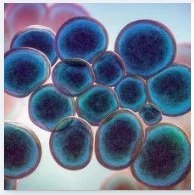Infographics
The Mosaic Brain: How somatic mutations cause brain diseases
It’s All in the Timing: Optimizing Chemotherapy Administration
What’s Mine is Yours: The Immunogenetics of Mating in Anglerfish
Podcasts
DIY Cells: Understanding Life with a Synthetic Minimal Cell
Modeling Epilepsy in a Dish Using Patient-Derived iPSCs
Homing in on New Anticancer Targets
Articles
Finding the cause of mammoth extinction
Environmental DNA and climate change data suggest that vegetation scarcity led to the mass extinction of herbivore species, including Arctic mammoths.
Showstoppers: Astrocytes and the plastic brain
New research demonstrates a key astrocytic mechanism in the early Drosophila larval circuit that enables termination of the critical period.
Message in a bottle: Developing mRNA therapeutics
A high efficiency, low toxicity method for direct RNA delivery into cells.
Streamlining membrane protein research with mass photometry
Mass photometry advances membrane protein characterization by offering fast and precise mass measurements of samples.
In love with the shape of you: Physical scaffolding defines organoid patterning
Controlling a growing tissue’s shape achieves deterministic and uniform patterning in intestinal organoids.
Broken clocks and mood swings:
The link between circadian clock changes and Lithium treatment in Bipolar disorder patients
How does COVID-19 take away your sense of smell?
It’s not the neurons in the nose and brain but the support cells that are likely to cause anosmia in COVID-19 patients.
Generating mini-guts for drug screening
Human gut organoids facilitate precise disease modeling and power high-throughput drug development efforts.
Revolutionizing cellular phenotyping with multiplex tissue imaging
Highly multiplexed tissue immunohistochemistry combined with an automated, high resolution imaging pipeline resolves unlimited protein targets in tissues.
Viral nucleic acid purification in a single spin
A simple nucleic acid extraction approach quickly purifies genomic viral RNA and DNA while minimizing cross-contamination risks.
Scientist profiles
A fly geneticist’s journey into discovering rules of organ development
2024 George W. Beadle Award recipient Deborah Andrew discovered new genes and pathways in Drosophila salivary gland organogenesis.
Unlocking mysteries of trait and disease heritability in dogs
2024 Edward Novitski Prize recipient Elaine Ostrander, a pioneer of the domestic dog model, discovered genes affecting dog size, morphology, and behavior.
Build-a-Genome course: Recruiting an army of undergraduates to synthesize yeast genome
2024 Elizabeth W. Jones Award for Excellence in Education recipient Jef Boeke transformed his landmark synthetic yeast genome project into a teaching course.
The worm whisperer: One scientist’s journey into understanding worms
2024 Thomas Hunt Morgan Medal recipient Paul Sternberg’s decades-long discoveries in worm physiology, development, and behavior.
A microbiologist’s quest to understand CRISPR in bacterial self-defense
2024 Genetics Society of America Medal recipient Luciano Marraffini determined how CRISPR-Cas systems destroy genetic targets with precision.
A young professor shaping how to study and communicate chromosome dynamics
2024 Genetics Society of America Early Career Medal recipient Ofer Rog pursues a mechanistic understanding of chromosome structure and function.
Marketing content
Structural Biology: Tools of the trade
Untangling Neuro- degeneration with Cryo-EM
Understanding cancer with precision medicine
Revealing Gene Functions in Health and Disease
From concept to cure: AAVs in gene therapy
Understanding Spatial Biology


